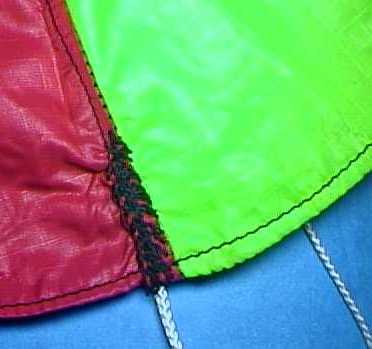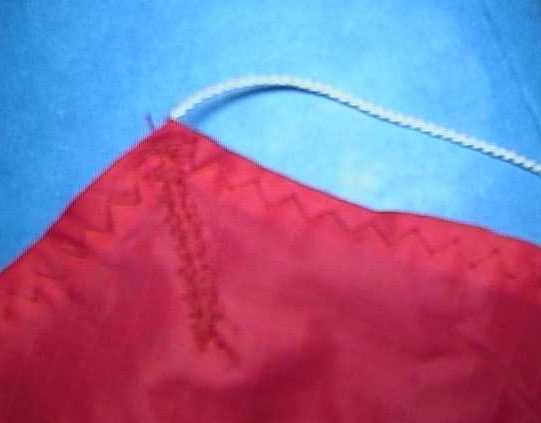(Take me to the 38" Parachute Review)
The J&P Parachute arrived in a standard size ziplock bag with a small label indicating its manufacturer, that it was "multi-colored" and its size, 14". Nothing fancy, but, then again nothing fancy expected. After initial inspection, tests were conducted to determine the performance of this parachute.
CONSTRUCTION:
![[Pic]](/images/archive/images2/jp_parachute.jpg) The construction of the
J&P parachute has several
things to take note of.
The construction of the
J&P parachute has several
things to take note of.
First, its size. It indicated that it is 14", however, when measuring across the diameter the measurement was 12". This has been the case with other parachutes I have used, however, it doesn't usually vary by more than a 1/2". I have confirmed with J&P that this must have been a shipping mistake, and that if made aware of it, they would have corrected it. Also, the J&P parachute has a 2" spill hole in the center.
As the parachute is inspected closer and
compared to a generic 12" parachute some other details are noticeable.
The J&P is made up
of twelve panels of multiple colors creating a round (dome) parachute.
The colors are yellow, red, light green, purple, dark green and black.
There are eight shroud lines attached which are spaced every two panels.
Spacing every two panels (out of twelve) would normally allow only six shroud
lines to be attached, however, J&P has added another pair
thereby requiring that in two places, 180 degrees apart, there are two shroud
lines connected at the same point (a benefit, according to
J&P, is that it doubles
the shred-resistance). The shroud lines are made of 1/16" braided nylon
and are 14" long. These are larger when compared to the generic 12"
parachute's 1/32" braided nylon which are 12" long.


Another point about construction can be seen in the two pictures above and one below. Notice the J&P parachute on the left. Notice the stitching around the edge of the parachute and the panels. I'm not a seamstress, however, the stitch is much finer and appears more durable than the generic parachute on the right, which has a zig-zag stitch. The picture below shows the underside of the J&P parachute and how the stitching looks.
![[Closeup]](/images/archive/images2/jp_parachute1.jpg) Overall, the
construction and materials used in the
J&P parachute seem to set
it apart in quality and durability from other generic parachutes.
Overall, the
construction and materials used in the
J&P parachute seem to set
it apart in quality and durability from other generic parachutes.
FLIGHT/RECOVERY:
I flew the J&P in several different rockets as outlined below. I have read in various publications that a recommended descent rate is between 12 and 16 feet/sec. I actually prefer a little faster and find that landing in the grassy field allows for it. The table below shows the rockets, number of flights and the weight of the rocket with an expended motor. I then used Apogee'sRockSim 3.0 to calculate the descent rate on the various rockets. RockSim was set up for a 12" round parachute with a 2" spill hole. Notice at the bottom the weight range to obtain the recommended 12 to 16 feet/second descent rate.
Even though it was flown successfully, some good packing had to be done to get the J&P parachute into the Hex Courier and the SLAT/s. Both rockets have a 1" diameter, whereas, the J&P fit nicely into the Serval and Icarus which have 1. 3" diameter.
The
J&P successfully opened
and recovered the rockets tested for a total of 14 flights. Only one mishap
occurred. Only one mishap occurred. Once on the Icarus, at ejection, the parachute somehow got
caught up by the motor hook. Other than the small amount of damage
caused by the hot hook, the J&P parachute shows no signs
of wear on the seams or shroud lines.
| |
|
|
(round 12"/2" spill) |
| |
|
|
|
| |
|
|
|
| |
|
|
|
| |
|
|
|
| |
|
|
|
| |
|
|
|
| |
|
|
|
One of the questions asked to me by J&P was, "did I notice the speed the 'chutes open?" So I set out to try to determine the speed that the parachute opens. Has anyone ever tried this? It was tough and pretty subjective.
I used a stop-watch and smaller motors to
allow me to see the entire flight. Using the Serval, first on A8 motors. I flew the rocket three
times using the J&P
parachute and three times using the generic 12" parachute. I clicked the
stop watch as soon as I saw the ejection and clicked again as soon as I saw
full deployment. The parachutes were folded as close to the same as possible
and the shroud lines were folded into the parachute. Notice the trend on
the Serval for both parachutes? This must
be the subjectivity of the testing.
| J&P | Other 12" | J&P | Other 12" | ||
| A8 #1 | 1.09 | 1.45 | B6 #1 | 0.51 | 0.48 |
| A8 #2 | 0.73 | 0.73 | B6 #2 | 1.16 | 0.65 |
| A8 #3 | 0.69 | 0.64 | B6 #3 | 0.54 | 0.45* |
| Average | 0.84 | 0.94 | Average | 0.74 | 0.53 |
I did a similar test using the Blobbo. The exact same folding technique, as used on the Serval, was used for test #1 and #3. I decided to fold it differently for test #2. On that test, I folded the parachutes and tightly wrapped the shroud lines around each parachute. Also, it should be noted that on test #3, the generic 12" parachute deployed but then got tangled for another half of second and deployed again. I had already stopped the watch so I missed the extra time.
My thoughts about the tests above are that they are inconclusive. Yes, maybe the J&P opens faster and with less problems, however, it's within 10ths of a second. Perhaps, J&P's larger parachutes will have a more noticeable opening speed.
Watching 14 flights gave me a good feeling about this parachute's performance. Whether it opened faster or not doesn't matter to me. Overall, I would rate this parachute 4 1/2 points, only slighting it on the fact that it was presented as a 14" parachute, but measured as a 12".
The 38" PARACHUTE:- by Jim Stuckman
CONSTRUCTION:
The first thing I noticed upon removing the 'chute from the ziplock bag is the quality of materials and construction! The 'chute consists of 14 panels of rip-stop nylon. The 'chute has a spill hole of just over 6" diameter. The shroud lines on this parachute are much heavier than of the parachutes of similar size supplied with many kits. The lines are approximately 3/16"! They are securely stitched to the canopy. I could find no flaws in material or workmanship.
FLIGHT/RECOVERY:
I flew the 'chute in an ADR 4. 0 kit from Atlantic Rockets. The motor was a G35-4 Econjet. The true test came when the delay ran long. The rocket had gone well past apogee and was beginning to really gain speed when the ejection charge fired. I was sure it would be a shred! To my pleasant surprise, the 'chute opened crisply for a perfect deployment! The guys around me had two things to say when the 'chute deployed - "tough 'chute!" and "look at the colors, they really show up in the sky". I agree with both statements.
After examining the 'chute and finding it in perfect condition after the high speed deployment I am convinced this is a very tough 'chute! The multi-color design did seem to show up very well against both blue sky and clouds.
CONCLUSION:
I'm impressed with the quality, durability and value of the J&P parachute. It is going to be installed in my soon to be completed North Coast Interceptor G instead of the stock parachute. This would make a great upgrade to the typical kit supplied parachute. If you are looking for a quality parachute at a reasonable price I highly recommend you look at a J&P product. Overall, I would rate this parachute 5 points.
Sponsored Ads
 |
 |











